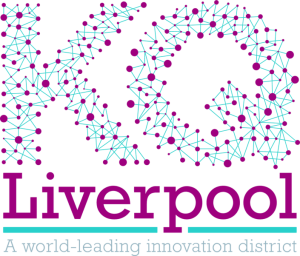A recent RCP & KQ Liverpool Roundtable brought together local leaders from the public, private and education sectors to discuss the current strengths and future opportunities for enhancing Liverpool’s innovation district.
On Tuesday 28th February, key Liverpool City Region stakeholders gathered to discuss the importance of health and wellbeing at the heart of the regeneration of Liverpool, in addition to affirming their collective drive to inclusive growth, removing the barriers to work and increasing productivity across the City Region.

The strategic importance of Knowledge Quarter Liverpool (KQ Liverpool) as an Innovation District was also at the forefront of discussions, bringing the Royal College of Physicians (RCP) together with the local NHS Trusts, Universities, City and Private Sector, to create something even greater than the sum of its parts.
The event began with a warm welcome from Dr Ian Bullock, CEO of the Royal College of Physicians, explaining how this roundtable provided an ideal opportunity to build on the momentum first started back in 2028/19, when the RCP announced plans to set up their northern home in The Spine in KQ Liverpool. He explained,
“With the vibrancy of Liverpool’s culture playing an important part in bringing inward investment into the region, it also encourages innovation in the city, addressing societal issues with job opportunities, equality and access to health.”
Ian hoped that today’s event would spark new conversations which led to, perhaps unlikely, partnerships. With something new happening in our city all the time, he strongly believes in the ‘better together’ principle.


Dr Carol Costello, Chair of KQ Liverpool, agreed that the importance of all KQ Liverpool partners working together to knock down barriers, cannot be underestimated.
“We have a great opportunity to combine our wishes and brains to make us hugely attractive to lots of private sector organisations, to come in and work with our talented community.”
She also strongly urged attendees to not think in individual silos, but to ask our wider network for support in working together to make a difference.

The work undertaken to date by the KQ Liverpool partners was praised by Mayor Joanne Anderson at Liverpool City Council, explaining that the resulting positive impact on economic productivity in our region shouldn’t be underestimated. She also emphasised that we all play a vital role which can impact direct investment into health and life sciences greater in the north, than London.
The KQ Liverpool innovation district has grown significantly since its inception in 2016, and there are a number of future projects in the pipeline that will help it to develop further.
Professor Mark Power, Vice Chancellor at Liverpool John Moores University (LJMU), said,
“Our new 7 acre Faculty of Health at Copperas Hill will be a driver and powerhouse, which places Liverpool on the map for NHS workforce development. Recognising that KQ Liverpool is a partnership of the city, not just in the city, will bring in high quality jobs and graduate talent, and provide our local community with a choice of staying or leaving upon graduation, and not automatically having to leave for better opportunities elsewhere. We must open our doors to the population on our doorstep to achieve a forward thinking and inclusive agenda.”
These sentiments were echoed by Professor Tim Jones, Vice Chancellor at the University of Liverpool, who agreed with this university perspective.
“We need to get out and showcase what we’re really good at, to make sure Westminster and leading businesses know about our specialisms, so they too can be great advocates for Liverpool.”
By joining up our key messages and animating partnerships, we can both encourage inward investment and upskill the local community. Programmes such as KQ Liverpool’s Sixth Form Into Science are a fantastic example of this. The programme works with local secondary school pupils, demonstrating what innovation assets are located right on their doorstep, and encourages young people to learn about the innovation, science and technology career opportunities available within KQ Liverpool, with an aim of creating tangible aspirations.

Councillor Liam Robinson, added:
“KQ Liverpool is an expert cluster where innovation in health and life sciences is very important, let’s not hide our light under a bushel. That said, how can we build on this?”
He went on to acknowledge the growth of The Spine and its huge importance for the city, in addition to the exciting rapid transit network plans which will provide enhanced transport links for the region.
“As a world leading innovation hub, we have a huge opportunity to be better understood across the country, ensure a high level of graduate retention and make sure that neighbouring communities get to benefit from the growth of the Paddington Village site.”
Paddington Village is a new, innovation-led destination for businesses to thrive in the KQ Liverpool Innovation District. Owned by Liverpool City Council and with funding support from the Liverpool City Region Combined Authority, Paddington is an urban village that has Science, Health, Education and Technology, within its DNA. Plans for the next development, Sciontec’s HEMISPHERE – the first operational net zero carbon new build in the Liverpool City Region – is next in line.

Providing a commercial perspective to this conversation was Dr Kath Mackay, Director of Life Sciences at Bruntwood SciTech.
“I have a holistic view of how the UK is doing across health and life sciences, and Liverpool is certainly credible for infectious diseases and health data. One challenge is that all innovation clusters claim to be good, so it can be hard to promote exact specialisms. The Liverpool City Region however has a true identity, and with public and private partnerships really starting to work, they will be a magnet for small businesses to grow.”
The recent Science and Innovation Audit (SIA) mapped LCR’s research and innovation strengths as Infection Prevention & Control, Materials Chemistry, and AI Solutions & Emerging Technologies, resulting in a real global competitive advantage. Net Zero & Maritime was also evidenced as an emerging capability.
Professor Iain Buchan, University of Liverpool, then discussed the importance of advocacy, ambition, culture and the drive to innovate.
“Liverpool has always had an attitude of begging for forgiveness rather than asking for permission. Health tech is booming, but a lot of innovation goes into end of life care in the US, rather than helping those locally in direct need. A civic approach is needed to better coordinate care, and I admire how the RCP has spoken up for those underserved.”
There is no doubt that AI is changing medicine and healthcare, and with evidenced, world leading capabilities in this field, Liverpool is already ahead of the curve in creating valuable solutions to these challenges.
Dr Ian Bullock, confirmed that the RCP has been developing a digital strategy over the last three years and is already closely connected with Prof Iain Buchan.
“The power of data and the use of technology can help move us forward and be part of the solution. The management of chronic diseases is something we are already proactively part of, having brought 200 organisations together to focus on health inequalities. With regards to helping the city region to improve access to health, this can be done by joining the primary, secondary and tertiary care, using AI as an enabler.”

One of the most recent additions to the KQ Liverpool business community is Elida Beauty, a new Personal Care Business Unit within Unilever, who moved into Liverpool Science Park to set up their Global Product Development Hub. Tom Gibbons, Elida Beauty expressed his enjoyment of the authenticity in what people are doing here, as well as the level of ambition observed within KQ Liverpool. On AI and the implementation of technology, he said:
“The foundation required for success in this field is a critical mass of skills. There’s a lot we can do to contribute to and educate businesses and funders, and having the skills required will enable the technology to land firmly and be sustained.”
He finished by emphasising that Elida Beauty were looking for partnerships to leverage R&D capabilities and would be keen to explore any collaboration opportunities within KQ Liverpool.
KQ Liverpool’s ethos is to encourage collaboration and partnership working between the organisations located within the dynamic 450 acre innovation district. In addition to this being clearly witnessed within the health and life sciences sector, Liverpool also has an aim to be known as the destination for digital manufacturing.
The Manufacturing Technology Centre (MTC), part of the High Value Manufacturing Catapult, is a leading organisation in this sector and its Digital Manufacturing Accelerator is located within Liverpool Science Park. Dr Charlie Whitford, Director of North West and Regions at the MTC, said:
“We are moving into a world where there is more and more cross fertilisation of sectors, so collaboration is fundamental. We are working with the FMCG sector and also do a lot of work with central government departments across the UK, and we’re seeing that government procurement is now based on value driven outcomes, such as shared inputs and shared outputs. Collectively, we can come together as leaders to demonstrate this value to drive investment into Liverpool.”

Alex Cousins, Director of Local and Devolved Government, at Connected Places Catapult, agreed, saying:
“I wanted to level up as soon as I came into this role. I am keen to form partnerships in all regions and have an ambition to take space in Liverpool, to enable us to run more projects here.”
Another strong advocate for the Liverpool City Region, already based in the Sciontec AI space at The Spine, is Lorna Green, CEO of LYVA Labs.
“We were a start up in January 2022, and have now expanded to 8+ team members, and were recently awarded the Advanced Manufacturing Innovation Cluster Manager role for Liverpool City Region, as part of Innovate UK’s ground-breaking Launchpad programme. We’ve had so much support from the KQ Liverpool team, which we are extremely thankful for.”
Colin Sinclair explained:
“The RCP has allowed Sciontec to use The Spine as an incubator for so many businesses within our Sciontec AI (all-inclusive) serviced workspace floors. We now have a fantastic mix of customers based here who are working within the health and life sciences, digital technology and professional services sectors, which are all adding to the growing innovation ecosystem with Paddington Village.”
Dr Ian Bullock concluded:
“Our original plans for The Spine included wanting to create a space for innovation, bringing important people together for multidisciplinary conversations. The Spine is a beacon of hope for the city, developed out of a baron piece of land and designed to create a true sense of wellbeing for its occupiers and the surrounding community. Today is all about celebrating where we have got to in our journey, but let’s keep the conversations going.”
Many thanks to all who attended.















